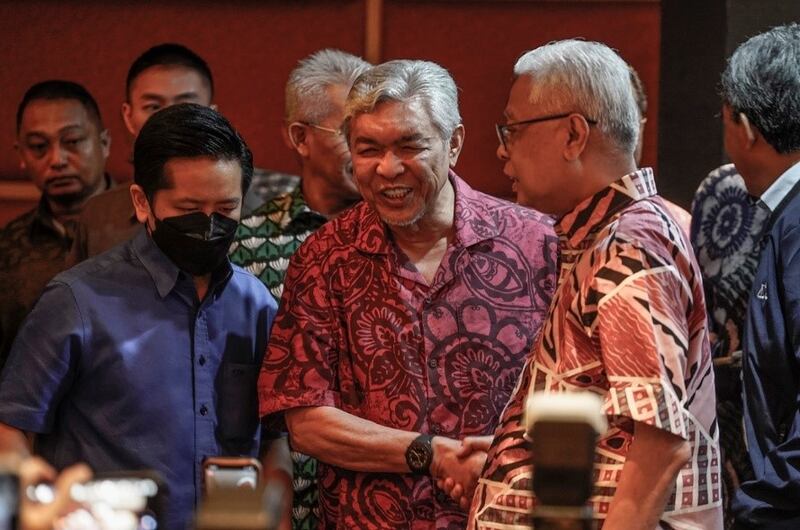Malaysia’s graft-tainted ruling bloc suffered a humiliating defeat in the Nov. 19 general election but may end up playing kingmaker in the formation of a new government, as details that emerged from talks on Monday show.
The country’s king meanwhile gave contending political parties another day to propose their prime ministerial candidates and show him that they have enough parliamentary support to lead the next government. The monarch is expected yet again to play a big role in deciding who that will be.
Two coalitions, Anwar Ibrahim’s Pakatan Harapan and Perikatan Nasional, a new bloc led by former Prime Minister Muhyiddin Yassin, are in contention to form the new government. But neither of them has won the simple majority of 111 parliamentary seats needed for this.
Both coalitions need to form alliances with other parties or coalitions to reach that magic number. And they’ve been in frenzied negotiations with others groups since the election results were declared early Sunday morning.
Anwar, whose Pakatan coalition won the most seats – 82 – said Monday that he was negotiating with his old foe, the ruling Barisan Nasional bloc, which captured 30 seats. This combination totals 112 seats, enough to form a government.
“I’m very pleased with the outcome of the meeting we had, with several representatives from Barisan Nasional (National Front) to discuss the issue of a coalition government, under my leadership,” the 75-year-old opposition icon told reporters after he met with Barisan leaders.
“I am satisfied because we focused on the need to form a government that is stable. We require political stability to carry the country forward.”
The meeting however was not conclusive because Barisan had yet to make a final decision, Anwar added.
“I am still optimistic that we will be able to form a more transparent and democratic government for the benefit of the people. Negotiations are going smoothly, but the Barisan leaders are asking for some time before finalizing the decision after holding a meeting with other parties,” he said.
A day earlier, a regional party from Sarawak state in Borneo, Gabungan Parti Sarawak, which won 23 seats, presented its own formula, it said, in the interest of a “stable government.”
It said it would support Perikatan – which won 73 seats, the second-highest number – along with Barisan and another regional party that has six seats. This combination totals 132 seats, enough to form the government.
What is clear is that Barisan, although it was crushed in Saturday’s polls, finds itself in a position to decide who may form the government, said Lau Zhe Wei, assistant professor at the International Islamic University of Malaysia.
“Both sides need Barisan Nasional. Even though Muhyiddin did not mention it in any of his statements, others had,” Lau told BenarNews.
“Otherwise, there would not be enough numbers to form a government.”
According to the leader of Sarawak’s GPS and the Malaysian Islamic Party (PAS), which is a constituent of Perikatan, some Barisan lawmakers are backing Muhyiddin to form the government.
“I have been told that there are 18 [Barisan MPs] who have stated support, which will allow Perikatan to form a government,” local media quoted Muhammad Sanusi Md. Nor, the election campaign director for PAS, as saying late Sunday.
Amid these maneuverings, Barisan chairman Ahmad Zahid Hamidi came out late Sunday to dismiss talk of any negotiation with Muhyiddin’s Perikatan.
“[B]arisan Nasional has never been in negotiation or agreed with Gabungan Parti Sarawak to form a government with Perikatan Nasional,” Zahid said.
Muhyiddin did not comment on Monday, although on Sunday, he said he was in talks with Sarawak’s GPS and “other like-minded parties and independent MPs.”

Dissension in the ranks
Not everyone in Barisan is happy with Zahid’s negotiations with Anwar.
One of the dissenters is Hishammuddin Hussein, the incumbent government’s defense minister, who said he would rather be dismissed than compelled to support Pakatan.
“No Anwar, No DAP – those who feel they can sack me me for sticking to this stance, go ahead,” the senior United Malays National Organization (UMNO) leader said in a Facebook post.
UMNO is the core party in Barisan.
It has always championed Malay nationalism and has a deep distrust of the Democratic Action Party (DAP), which it sees as putting the interests of ethnic Chinese Malays front and center, to the detriment of Malaysia’s ethnic Malay majority.
Meanwhile, some analysts wonder about what Anwar’s stance would be on a corruption case against Zahid, who is the president of UMNO.
After all, Anwar and Pakatan campaigned on an anti-corruption and institutional reform platform. When asked about the issue, Anwar said his discussions with Barisan representatives only focused on policy issues and nothing related to graft was discussed.
“The discussion was about policy issues and the need to create a stable and inclusive government,” Anwar said.
“The [graft] cases are not related to what has been discussed. The judiciary must be independent, and not be linked to the executive. The issue was not discussed at all.”
Anwar used to be an UMNO man, but he was expelled from the party in 1998 for criticizing the then-Barisan government.
Since then, Anwar has railed against UMNO and its Malay nationalist ideology. He has also said that the party and Barisan’s 60-year reign in Malaysian politics has led to corruption, nepotism and cronyism.
Unlike Anwar, Muhyiddin – also a former UMNO man – shares that party’s Malay nationalist ideology.
Even if he were a better fit with Barisan, another observer, Azmil Tayeb, said any alliance government would be shaky.
“I don’t think any government formed out of an alliance of convenience for the sake of attaining power would be stable,” said the political analyst from University Science of Malaysia.
Fitri Hazim in Kuala Lumpur contributed to this report.
